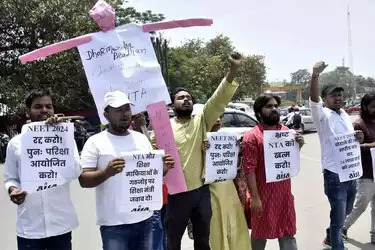The National Eligibility cum Entrance Test (NEET), a standardized examination for admission to medical and dental courses across India, has sparked renewed debate and controversy following allegations of paper leaks and concerns over its impact on students. This blog delves into the arguments for and against abolishing NEET, examining perspectives from prominent voices such as DMK’s TKS Elangovan and West Bengal CM Mamata Banerjee amidst the ongoing discourse.
The Purpose and Controversies of NEET
NEET was introduced to streamline the admissions process for medical and dental colleges, replacing multiple entrance exams conducted by individual states and private institutions. Proponents argue that NEET ensures fairness, transparency, and meritocracy in admissions, leveling the playing field for students from diverse backgrounds across the country.
However, the examination has faced criticism and scrutiny over various issues, including allegations of paper leaks, discrepancies in question papers, and concerns regarding its socio-economic impact on aspirants from marginalized communities and rural areas.
Calls for Abolition: DMK’s TKS Elangovan and Mamata Banerjee’s Stance
In light of recent controversies surrounding NEET, voices advocating for its abolition have gained traction. TKS Elangovan of the DMK and West Bengal Chief Minister Mamata Banerjee have publicly called for scrapping NEET altogether, citing systemic flaws, unfair advantages, and the stress imposed on students preparing for the exam.
Elangovan and Banerjee argue that NEET’s centralized nature disadvantages students from state boards and non-English medium backgrounds, who may not have access to quality coaching or resources to compete effectively in a standardized test format.
Arguments Against Abolition: Meritocracy and Standardization
On the other hand, proponents of NEET argue that abolishing the exam could lead to a return to fragmented admission processes, varying standards across states, and potential compromises in educational quality and transparency. They maintain that NEET ensures a standardized evaluation of students’ academic aptitude and readiness for medical education, promoting merit-based admissions and professional competence in the healthcare sector.
Policy Reforms and Middle Ground
Amidst the polarizing debate, there are calls for comprehensive reforms rather than outright abolition. Suggestions include enhancing transparency in examination processes, improving security measures against malpractice, providing equitable access to coaching and preparatory resources, and addressing socio-economic disparities that affect students’ preparation and performance.
Sponsored
FACTS Transcripts
Apply for a University document anywhere
https://www.factstranscript.com
Quick Transcripts for popular Universities, check your University name now and get started. We help you to get your transcript application online which is accepted for use of IRCC.
No DD, NO Paperwork. 100% Authentic, Reliable.
FACTS Transcripts Charges · Reviews · Assam Universities · Home · Know your University










